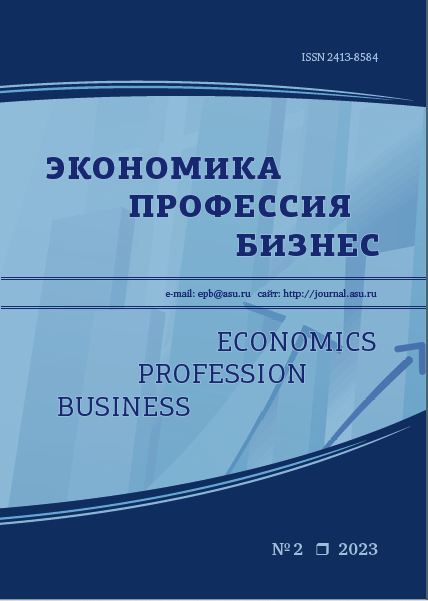IDENTIFICATION OF NEEDS IN THE PROCESS OF REPRODUCTION OF THE NATURAL FORM OF THE PUBLIC PRODUCT
УДК 338.3
Abstract
The article is devoted to justifying the importance of self-study of the natural side of the process of reproduction of a public product and justifying methodological approaches to its research. The authors note that in modern reality there are important socio-political, cultural and psychological processes related to the production of a natural product, various kinds of socio-economic experiments related to consumption management are observed, which remain out of sight of economic science. The processes noted can be considered as a transition from managing the production of life benefits to managing their consumption, which affects the volume and structure of the natural product produced. As a methodological approach, the definition of utility as a designated need has been proposed for the first time. The stages of the process of determining the demand for a natural form of a labor product are considered. The connection of needs with lifestyle and worldview, as two sides of culture, is shown. On this basis, the approach to culture as the final factor of reproduction of a natural social product is justified.
Downloads
Metrics
References
Васильчук Ю. А. К общей теории социального развития человека // Материалы постоянно действующего междисциплинарного семинара клуба ученых «Глобальный мир». Вып. 2 (14). М., 2002. 256 с.
Катасонов В. Ю. Читая Шваба. Инклюзивный капитализм и великая перезагрузка. Открытый заговор против человечества. М., 2021. 330 с.
Прохоров А. В., Разлогов К. Э., Рузин В. Д. Культура грядущего тысячелетия // Вопросы философии. 1998. № 6.
Чеховский В. Я. Введение // Маркс К. Капитал. Критика политической экономии. Т. 1. Кн. 1. Процесс производства капитала / под ред. В. Я. Чеховского. М., 2015.
Кондрашов П. Н. Нелепость, ставшая привычкой // Свободная Мысль. 2016. № 5.
Ильин Е. П. Мотивация и мотивы. СПб., 2000. 512 с.
Маркс К. Введение (Из экономических рукописей 1857-1858 годов) // К. Маркс и Ф. Энгельс. Соч. Изд. 2, Т. 12.
Добрыднев С. И. Образ жизни и мировоззрение как сущностные стороны предпринимательской культуры // Креативная экономика. 2021. Том 15. № 6. С. 2335-2346. DOI: 10.18334/ce.15.6.112197.
Петров И. Ф., Петров Л. И. Потребности и потребление в современном общественном развитии // Вестник ИМСИТ. 2013. № 3-4 (53-54). С. 3-8.
Бергер П., Лукман Т. Социальное конструирование реальности. Трактат по социологии знания. М., 1995. 323 с.
REFERENCES
Vasilchuk Yu. A. To the general theory of human social development. Materials of the permanent interdisciplinary seminar of the club of scientists «Global World». No. 2 (14). Moscow, 2002. 256 p.
Katasonov V. Yu. Reading Schwab. Inclusive capitalism and veajubilant reboot. Open conspiracy against humanity. Moscow, 2021. 330 p.
Prokhorov A. V., Razlogov K. E., Ruzin V. D. Culture of the coming millennium. Questions of philosophy. 1998. № 6.
Chekhovsky V. Ya. Introduction. Marx K. Capital. Criticism of political economy. T. 1. Ch. 1. Capital production process / edited by V. Ya. Chekhovsky. Moscow, 2015.
Kondrashov P. N. Absurdity, which has become a habit. Free Thought. 2016. No 5.
Ilyin E. P. Motivation and motives. St. Petersburg, 2000. 512 p.
Marx K. Introduction (From the economic manuscripts of 1857-1858). K. Marx and F. Engels. Op. Ed. 2, vols. 12.
Dobrydnev S. I. Lifestyle and worldview as essential aspects of entrepreneurial culture. Creative economy. 2021. V. 15. No 6. Pp. 2335-2346. DOI: 10.18334/ce.15.6.112197.
Petrov I. F., Petrov L. I. Needs and consumption in modern social development. Vestnik IMSIT. 2013. No 3-4 (53-54). Pp. 3-8.
Berger P., Lookman T. Social construction of reality. Treatise on the sociology of knowledge. Moscow, 1995. 323 p.
Economics Profession Business is a golden publisher, as we allow self-archiving, but most importantly we are fully transparent about your rights.
Authors may present and discuss their findings ahead of publication: at biological or scientific conferences, on preprint servers, in public databases, and in blogs, wikis, tweets, and other informal communication channels.
Economics Profession Business (EPB) allows authors to deposit manuscripts (currently under review or those for intended submission to EPB) in non-commercial, pre-print servers such as ArXiv.
Authors who publish with this journal agree to the following terms:
- Authors retain copyright and grant the journal right of first publication with the work simultaneously licensed under a Creative Commons Attribution License that allows others to share the work with an acknowledgement of the work's authorship and initial publication in this journal.
- Authors are able to enter into separate, additional contractual arrangements for the non-exclusive distribution of the journal's published version of the work (e.g., post it to an institutional repository or publish it in a book), with an acknowledgement of its initial publication in this journal.
- Authors are permitted and encouraged to post their work online (e.g., in institutional repositories or on their website) prior to and during the submission process, as it can lead to productive exchanges, as well as earlier and greater citation of published work (See The Effect of Open Access).









